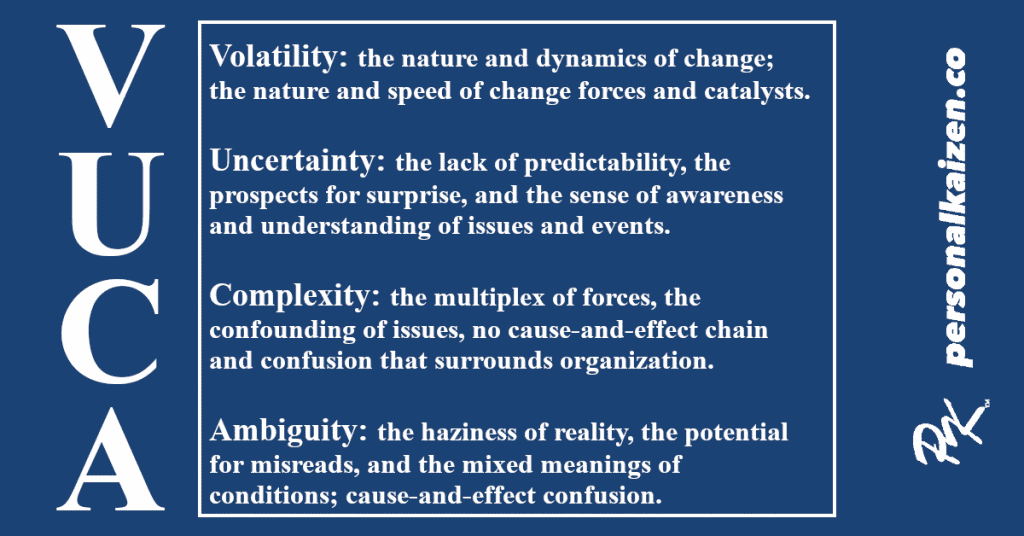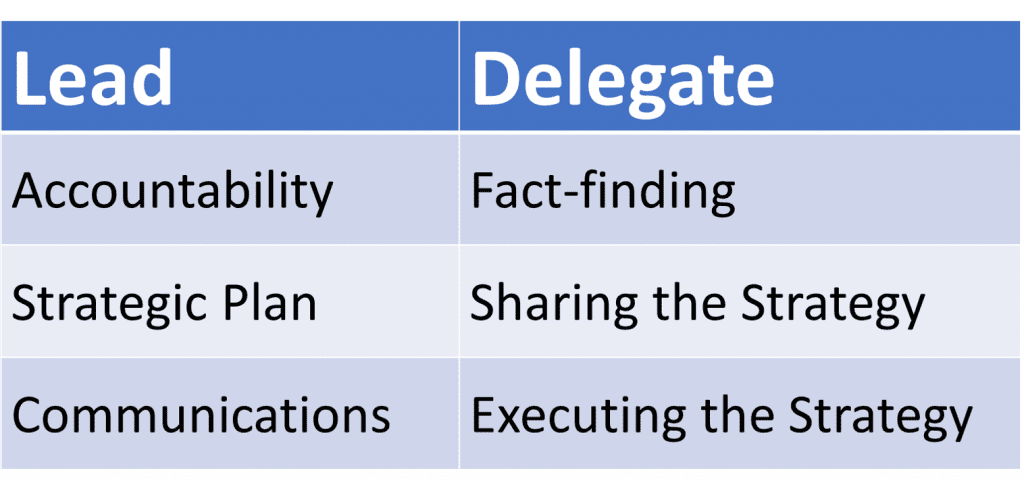Our posts over the past several weeks have covered leadership challenges during the COVID-19 pandemic. How we work, where we work, how we meet, and how we measure results have all have been tested in the past several years. We have learned lessons for leading in uncertainty from a healthcare CEO and 13 leadership lessons from the late Colin Powell. We also shared tips for leading a remote workforce, reviewed work from home hacks, and delivered tips for leading a better virtual meeting.
This post focuses on seven general strategies for leading in uncertainty, whether it is during the COVID-19 pandemic or any other crisis or challenging period.
1. Reset to focus on short term goals
Uncertain times often require leadership to put the long-term strategy on pause. The organization will need to evaluate the crisis quickly, and then create a short-term strategy to adapt to the new reality. Initial objectives may include understanding the scope of the crisis and determining the initial actions the organization will take in response.
The short-term goals will help your organization make some immediate decisions and changes. This will help your team move away from feeling like helpless victims of the crisis and shift the momentum. Be sure to celebrate any initial accomplishments with your team even if the results are only minor.
2. Understand that you will not have the answers
A crisis will often require you to rethink your strategy. As an issue or crisis unfolds you and your team will be forced to admit what you don’t know:
- The full effect(s) of the issue
- How long the issue will last
- How your customers will be affected and the choices they will make
- What your competitors will do in response to the crisis
It is helpful at the beginning of a crisis to stay calm and focus on what is known about the effects. Use the facts to estimate several different scenarios as potential outcomes. Sound reasoning will help you and your team set some initial goals but realize that your initial strategies will often be proven inadequate later, especially if the crisis has elements of VUCA.

Complex problems contain many interdependent elements that change in unpredictable ways. Interdependencies may be new or unknown and solutions will not be clear-cut. As a result, solutions often emerge through experimentation and require leaders who encourage trial and error and have the discipline to ask questions and allow people to take risks.
3. Experiment to learn what works
Leaders must be willing to make decisions quickly, evaluate outcomes, and then adjust to shifting realities. Aim for progress ad be willing to fail. Encourage your people to also make decisions quickly in the interest of learning.
Expect your people to make mistakes. Have the patience to realize that this experimentation is actually developing new skills in your people. Help your team learn from the mistake so you can try a different (better) action the next time.
4. Ensure your people feel safe
UMass Memorial Health Care CEO Eric Dickson notes the importance of ensuring your people feel safe and cared for. His organization committed to no furloughs and layoffs during the COVID-19 pandemic despite financial losses. Dr. Dickson explains, “we stood by our people through all of this, we didn’t do some of the things that almost every other healthcare system did,” and attributes this employee commitment to his organization recovering quickly while other healthcare systems continued to suffer losses.
When the going gets tough, be sure to take the extra time to demonstrate your belief in your people. When you are committed to your people they will stay committed to you. A crisis is the most important time to ensure each individual on your team knows that you have their back.
“Stand by your people and your people will stand by you.”
Eric Dickson
5. Decide when to lead and when to delegate
A good leader must step up and lead at the beginning of a crisis and then avoid micro-managing every aspect of the response as the issue develops. The main focus of the leader must be on communications and accountability so their people can implement the strategic response (the corrective action).
What to lead:
- Communcations with your people to share the facts and focus on a strategy
- Communications with customers
- Forming a strategy to deal with the uncertainty/crisis
- Clarifying the strategy and setting clear expectations with measurable goals for your people
- Communications with the press – use the media to your advantage
What to delegate to your people:
- Fact finding to understand the crisis and uncertainty as the issue develops
- Support with forming the strategy to deal with the uncertainty/crisis
- Sharing the facts and strategy with the rest of the organization
- Executing the strategy, with allowance for trial-and-error and adjustment
- Reporting the results and adjusting the strategy as new information is learned

6. Don’t Go it Alone
Many leaders report feeling isolated and alone as they deal with change and uncertainty. They often keep the issues to themselves, not wanting to share their issues and concerns and risk scaring the rest of their team. Strategies formed in isolation can be a disaster when dealing with complex issues.
Moments of crisis and uncertainty are times when a leader will benefit the most from experienced outside support. The goals and strategies that you and your team are grappling with have often been dealt with before in other organizations. Do some research on coaches or peers that can help you sort out the facts, adapt your strategy, and set some initial goals. Reach out to your network or experts on strategic change for insight and a second opinion.
7. Perpetual optimism is a force multiplier

This is Colin Powell’s Rule #13 and the Personal Kaizen Rule #4. Staying positive is important for all leaders dealing with uncertainty. A leader with a positive attitude will transfer that optimism to the rest of their team. Staying positive and confident that your team will be able to deal with whatever the situation will support and enhance the six strategies above.
Following Powell’s Rule #1 can also help you and your team maintain some positivity. Remember that, “It ain’t as bad as you think. It will look better in the morning.”
Please let us know what additional strategies for leading in times of uncertainty we missed in the comments below.




